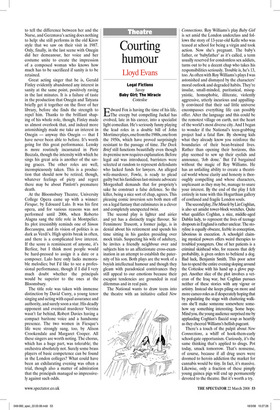Courting humour
Lloyd Evans
Legal Fictions Savoy Baby Girl; The Miracle Cottesloe
Edward Fox is having the time of his life. The creepy but compelling Jackal has evolved, late in his career, into a specialist light comedian. He’s seriously funny playing the lead roles in a double bill of John Mortimer plays, one from the 1980s, one from the 1950s, which have proved surprisingly resistant to the passage of time. The Dock Brief still functions beautifully even though its premise now requires explanation. Before legal aid was introduced, barristers were selected at random to represent defendants who lacked funds for lawyers. An alleged wife-murderer, Fowle, is ready to plead guilty but his fastidious last-minute advocate Morgenhall demands that for propriety’s sake he construct a false defence. So the killer, being a nice sort of chap, agrees. This pleasing comic inversion sets both men off on a legal fantasy that culminates in a clever and completely unexpected twist.
The second play is lighter and airier and yet has a distinctly tragic flavour. Sir Fennimore Truscott, a former judge, is in denial about his retirement and spends his time sitting in his garden presiding over mock trials. Suspecting his wife of adultery, he invites a friendly neighbour over and subjects him to an affectionate cross-examination in an attempt to establish the paternity of his son. Both plays are the work of a boyish intellectual humour and though they gleam with paradoxical contrivances they still appeal to our emotions because their escapist tendencies are grounded in real dilemmas and in real pain.
The National wants to draw teens into the theatre with an initiative called New Connections. Roy Williams’s play Baby Girl is set amid the London underclass and follows the story of 13-year-old Kelle who was teased at school for being a virgin and took action. Now she’s pregnant. The baby’s father, or ‘babyfather’ as it’s called, a term usually reserved for condomless sex addicts, turns out to be a decent chap who takes his responsibilities seriously. Trouble is, he’s 13, too. As often with Roy Williams’s plays I was astonished and dismayed by the characters’ moral outlook and degraded habits. They’re insular, small-minded, puritanical, misogynistic, homophobic, illiterate, violently aggressive, utterly incurious and appallingly convinced that their sad little universe encompasses everything life can possibly offer. Alter the language and this could be the remotest village on earth, not the heart of the world’s most diverse city. And I began to wonder if the National’s teen-grabbing project had a fatal flaw. By showing kids what they already know you reinforce the boundaries of their bean-brained lives. Rather than opening their horizons, this play seemed to sew up their eyelids and announce, ‘Job done.’ But I’d bargained without the magic of Roy Williams. He has an unfailing ability to create a theatrical world whose clarity and honesty is thoroughly compelling and whose characters, unpleasant as they may be, manage to snare your interest. By the end of the play I felt entirely in tune with this Hogarthian gallery of confused and fragile London souls.
The second play, The Miracle by Lin Coghlan, is also set amidst tower-block wretches. Quite what qualifies Coghlan, a nice, middle-aged Dublin lady, to represent the lives of teenage dropouts in England is rather unclear. The storyline is equally obscure, feeble in conception, laborious in execution. A schoolgirl claiming mystical powers offers weird therapies to troubled youngsters. One of her patients is a criminal skinhead who, for reasons that defy probability, is given orders to befriend a dog. Bad luck, Benjamin Smith. This poor actor has to spend the entire evening sloping around the Cottesloe with his hand up a glove puppet. Another slice of the plot involves a veteran of the Iraq war, but Coghlan pursues neither of these stories with any vigour or artistry. Instead she keeps piling on more and more cameo roles as if desperately hoping that by populating the stage with chattering walkons she’ll make someone somewhere somehow say something interesting. Some hope. Mind you, the young audience surprised me by applauding Coghlan’s flaccid soap as heartily as they cheered Williams’s hellish pageant.
There’s a touch of the pulpit about New Connections, a whiff of hook-them-early school-gate opportunism. Curiously, it’s the same thinking that’s applied to drugs. Pot today, smack tomorrow. That’s nonsense, of course, because if all drug users were doomed to heroin addiction the market for cannabis would be tiny. In fact, it’s massive. Likewise, only a fraction of these pimply young guinea pigs will end up permanently devoted to the theatre. But it’s worth a try.


















































































 Previous page
Previous page